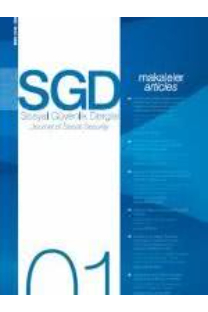Kendi Hesabına Çalışanların Kayıt Dışı İstihdama Bakışı
The Self-Employed View of Undeclared Work
___
- Bergolo, M. and Cruces, G. (2018). The Anatomy of Behavioral Responses To Social Assistance When İnformal Employment İs High. [Available at SSRN 3229548.
- https://www.iza.org/publications/dp/10197/the- anatomy-of behavioral-responses-to-social- assistance-when-informal-employment-is- high]. (Erişim: 03 Şubat 2019).
- Bolle, P. (1999). Innovations in Labour Statistics. International Labour Review. (138). No:1. 67-82. Geneva.
- Çelik, E. ve Güney, A. (2017). Kayıt Dışı İstihdam Olgusu ve Türkiye’de Kayıt Dışı İstihdam. İktisadiyat Dergisi. 1(1). 213-248.
- Çiğdem, S. (2018). Kendi Hesabına Çalışma ve Bağımlı Çalışma Arasında Bulanıklaşan Sınırlar: Bağımlı Kendi Hesabına Çalışma (Dependent Self-Employment). ICPESS (International Congress on Politic, Economic and Social Studies). Niğde 2018. [http://www.registericpess.org/index.php/ICPE SS/article/view/1682]. (Erişim: 21 Eylül 2019).
- Daza, José Luis (2005). Informal Economy, Undeclared Work and Labour Administration. ILO, Social Dialogue, Labour Law and Labour Administration Department. DIALOGUE Paper No: 9. ILO: Geneva. [https://www.ilo.org/ wcmsp5 / groups / public / --- eddialogue/lab_ admin/documents/publication/wcms_113918.pd f]. (Erişim: 03 Haziran 2019).
- Devlet Planlama Teşkilatı (2001). Sekizinci Beş Yıllık Kalkınma Planı. Kayıt Dışı Ekonomi Özel İhtisas Komisyonu Raporu. [http://www.sbb.gov.tr/wpcontent/uploads/2018 /11/08_KayitdisiEkonomioik614.pdf ].(Erişim: 16 Mayıs 2019).
- Duggan, C. (1998). Self-Employment in the UK and Ireland. International Conference on Self-Employment in Canada. [http://citeseerx.ist.psu.edu/viewdoc/download? doi=10.1.1.490.4220&rep=rep1&type=pdf]. (Erişim: 28.06.2019).
- Durusoy, N. Ö. ve Akbaş, S. (2018). Türkiye’de Kendi Hesabına Çalışanların Sosyal Güvenliği. Sosyal Güvenlik Dergisi. Cilt 8. Sayı 1. 67-94.
- Ercan, M. (2006). Kayıt Dışı Ekonomi ve Hızlı Tüketim Malları Sektörü. Nurol Yayıncılık. Ankara.
- Eurofound (2019). Self-Employed Person. [https://www.eurofound.europa.eu/observatorie s/eurwork/industrial relations-dictionary/self- employed-person.]. (Erişim:18 Haziran 2019).
- European Commission (2018). Glossary of Terms.[https://webmail.pau.edu.tr/?_task=mail &_action=get&_mbox=INBOX&_uid=14423& _part=2&_frame=1&_etwin=1]. (Erişim: 16 Mayıs 2019).
- Güloğlu, T., Korkmaz, A. ve Kip, M. (2003). Türkiye'de Kayıt Dışı İstihdam Gerçeğine Bir Bakış. Sosyal Siyaset Konferansları. 45.
- Gündoğan, N. (1999). Kendi Hesabına Çalışma: Kavram, Ölçüm ve Özellikleri. Ekonomik Yaklaşım. 10(34). 75 87.
- Gürsel, S. ve Pelek, S. (2008). Kayıt Dışı İstihdamın Ekonomik ve Toplumsal Özellikleri. Betam. Araştırma Notu: 8/11.
- Gürsel, S. ve Durmaz, M. (2014). Kayıt Dışı İstihdam Son Sekiz Yılda Azaldı. Betam. Araştırma Notu: 14/171.
- International Labour Organization (2013). Strategies For Transforming Undeclared Work Into Regulated Work. (The Informal Economy and Decent Work: A Policy Resource Guide Supporting Transitions to Formality).Employment Policy Department, Geneva.[https://www.ilo.org/wcmsp5/groups/p ublic/---ed_emp/--emp_policy/documents/ publication/wcms_212689.pdf ]. (Erişim:13 Haziran 2019).
- International Labour Organization (2018). [https:// www . ilo . org / global / statistics – and – databases / statistics overview – and – topics / status – in – employment / current - guidelines/lang--en/index.htm]. (Erişim: 06 Aralık 2018).
- International Labour Organization (2019). [https://www.ilo.org/ilostat files/Documents/ description_STE_EN.pdf]. (Erişim:12 Şubat 2019).
- International Social Security Association (2013). Revision of the International Classification of Status in Employmentb (ICSE-93). [https://www.ilo.org/wcmsp5/ groups/public/---dgreports/---stat/documents/ meetingdocument/wcms_223924.pdf ]. (Erişim: 08 Aralık 2018).
- Kalaycı, C. ve Kalan, E. Türkiye’de Kayıt Dışı İstihdamla Mücadele Politikalarının Analizi. Uluslararası Ekonomi, İşletme ve Politika Dergisi. 1(1). 17-34.
- Karadeniz, O. ve Karadeniz, H. (2016). Türkiye’de Eksik Ücret Bildiriminin Boyutları ve Çözüm Önerileri. Legal İş Hukuku Sosyal Güvenlik Hukuku Dergisi.
- Kavak, B. (2008). Pazarlama Araştırmaları Tasarım ve Analiz. Hacettepe Üniversitesi Yayınları. Ankara.
- Kayıt Dışı İstihdamla Mücadele Projesi. KADİM (2006). Başbakanlık Genelgesi. [http://www.resmigazete.gov.tr/eskiler/2006/10 /20061004-13.htm]. (Erişim: 16 Mayıs 2019).
- Kumaş, H. ve Çağlar, A. (2010). Türkiye’de Kadın Eksik İstihdamını Belirleyen Faktörler: TÜİK 2009 Hanehalkı İşgücü Anketi Ham Verileri İle Cinsiyete Dayalı Bir Karşılaştırma. Çalışma ve Toplum. 29(2). 248-289.
- Lehmann, H. ve Pignatti, N. (2018). Informal Employment Relationships and the Labor Market: Is There Segmentation in Ukraine? [https://www.iza.org/publications/dp/11256/inf ormal-employment-relationships-and-the-labor- market-is-there-segmentation-in-ukraine]. (Erişim: 03 Şubat 2019).
- Organisation for Economic Co-operation and Development (2008). Declarıng Work Or Stayıng Underground: Informal Employment in Seven OECD Countrıes.
- Organisation for Economic Co-operation and Development (2018). [https://stats.oecd.org/ glossary/detail.asp?ID=1986]. (Erişim: 22 Kasım 2018).
- Organisation for Economic Co-operation and Development (2019). [https: / / stats . oecd . org / glossary / detail . asp ?ID = 1985]. (Erişim: 04 Şubat 2019).
- Özcan, Z. (2011). Türkiye’de Kayıt Dışı İstihdam. (Basılmamış Yüksek Lisans Tezi). Marmara Üniversitesi. Sosyal Bilimler Enstitüsü. İstanbul.
- Sosyal Güvenlik Kurumu (2017). İstatistik Yıllıkları. [http://www.sgk.gov.tr/wps/portal/ sgk/tr/kurumsal/istatistik/sgk_istatistik_yilliklar i.]. (Erişim: 20 Mayıs 2019).
- Sosyal Güvenlik Kurumu (2017a). 2017 Yılı Faaliyet Raporu. [http://www.sgk.gov.tr/wps/ portal/sgk/tr/kurumsal/kurumsal_politikalar/faal iyet_raporu]. (Erişim: 25 Nisan 2019).
- Sosyal Güvenlik Kurumu (2019). [http:// www.sgk.gov.tr/wps/portal/sgk/tr/calisan/kayit disi_istihdam]. (Erişim: 16 Mayıs 2019).
- Türkiye İstatistik Kurumu (2017). Hanehalkı İşgücü Mikro Veri Seti.
- Türkiye İstatistik Kurumu (2017a). Kendi Hesabına ve İşverenler Araştırma Sonuçları 2017. Kendi Hesabına veya İşveren Olarak Çalışanların Son 12 Ayda Karşılaştığı En Önemli Zorluk [http://www.tuik.gov.tr/Pre Tablo.do?alt_id=1007]. (Erişim: 19 Haziran 2019).
- Türkiye İstatistik Kurumu (2018). [https://biruni.tuik.gov.tr/DIESS/TerminolojiLi stesiAction.do?baslangic=K]. (Erişim: 22 Kasım 2018).
- Türkiye İstatistik Kurumu (2019). [http://www.tuik.gov.tr/PreTablo.do?alt_id=100 7]. (Erişim: 18 Haziran 2019). Türkiye İstatistik Kurumu (2019a). [http://www.tuik.gov.tr/PreTablo.do?alt_id=100 7]. (Erişim: 05 Ocak 2019).
- Türkiye İstatistik Kurumu (2019b). [https://biruni.tuik.gov.tr/DIESS/TerminolojiLi stesiAction.do]. (Erişim: 12 Şubat 2019).
- Türkiye İstatistik Kurumu (2019c). İşgücü Piyasası ile İlgili Özel Konulu Çalışmalar. Kendi Hesabına ve İşverenler Araştırma Sonuçları. 2017 [http://tuik.gov.tr/PreTablo.do? alt_id=1007]. (Erişim: 24 Nisan 2019).
- Williams, C. C. ve Windebank, J. (2002). Informal Employment in Advanced Economies: Implications for Work and Welfare. Routledge.
- Williams, C. C. and Shahid, M. S. (2016). Informal Entrepreneurship and Institutional Theory: Explaining the Varying Degrees of (in) Formalization of Entrepreneurs in Pakistan. Entrepreneurship & Regional Development. 28(1- 2). 1-25.
- Yıldırım, A. (1999). Nitel Araştırma Yöntemlerinin Temel Özellikleri ve Eğitim Araştırmalarındaki Yeri ve Önemi. Eğitim ve Bilim. 23(112).
- ISSN: 2146-4839
- Yayın Aralığı: 2
- Başlangıç: 2011
- Yayıncı: SOSYAL GÜVENLİK KURUMU
Nagihan DURUSOY ÖZTEPE, Asiye KAMBER KIVCI
Türkiye’de Emeklilik Sistemlerinin Yaşlı ve Emekli Yoksulluğu Üzerine Etkisi
Değişen İstihdam Yapısı ve Genç İşsizlerin Gözünden Sendikalar
İşgücü Piyasası Durumları Arasındaki Geçişlerin Markov Modelleri ile İncelenmesi
Kendi Hesabına Çalışanların Kayıt Dışı İstihdama Bakışı
Uluslararası İlke ve Standartlar Bağlamında Yaşlı Hakları ve Sosyal Hizmet Uygulamaları
Sağlık Hizmetlerinde Geri Ödeme Yöntemlerinden Teşhis İlişkili Gruplar
